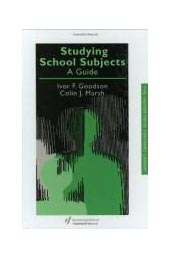Studying School Subjects: a guide
Conclusions, Complexities and Conjectures
The growth of environmental studies was treated in similar manner by the geographers. The discussion of the Executive Committee of the Geographical Association show precious little concern with the intellectual or epistemological arguments for environmental studies. The discussion focused on 'the threat to geography involved in the growth of environmental studies'. Indeed, when the possibility of a dialogue with environmental studies teachers was suggested 'some members felt that to do so would be tantamount to admitting the validity of environmental studies'. Carson's reminiscences of his talk to the Geographers' Conference tends to confirm the spirit in which new contenders for academic status were viewed if they were at all adjacent to geography's broad and shifting frontiers. The response was patently directed towards territorial defence - not academic dialogue. The most overt plea for defence rather than dialogue came in the Presidential Address to the Geographical Association in 1973. Mr A.D. Nicholls laid great emphasis on the 'practical realities' for 'practising teachers'. 'With constant pressure on teaching time, headmasters are ever searching for new space into which additional prestige subjects can be fitted, and the total loss of teaching time to environmental subjects may be considerable. Beyond these practical fears about the material interests of geography teachers, environmental studies evoked a particularly emotional response among geographers because of its proximity to geography's continuing identity crisis. Nicholls provides an unusually frank admission of the need for territorial defence being placed above any intellectual imperatives:
Ten years ago almost to the day and from this platform, Professor Kirk said 'modern geography was created by scholars, trained in other disciplines, asking themselves geographical questions and moving inwards in a community of problems; it could die by a reversal of the process whereby trained geographers moved outwards in a fragmentation of interests seeking solutions to non-geographical problems.' Might not this be prophetic for us today? Could it not all too soon prove disastrous if the trained teachers of geography moved outwards as teachers of environmental studies seeking solutions to non-geographical problems?
The fears which geographers expressed so strongly and emotionally about the emergence of environmental studies were not shared to the same degree by biologists. As we have seen only the field biology sub-group was threatened and they managed to expand into the growing territory of field studies. However in the negotiations at Schools Council the science subcommittee, which included a number of biologists, joined forces with the geographers in their opposition to the environmental studies 'A' level. In both sub-committees 'concern was expressed at the heavy overlap between this syllabus and syllabuses in both geography and biology.' The alleged overlap was coupled with exhortations to remove those 'irrelevant topics' not related to geography and biology. The result was the self-fulfilling indictment 'if irrelevant topics were envisaged as removed, the effect would be to reveal how close the resulting syllabus would be to existing syllabuses in geography'.
